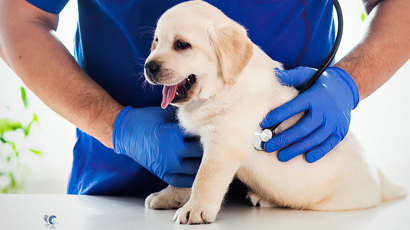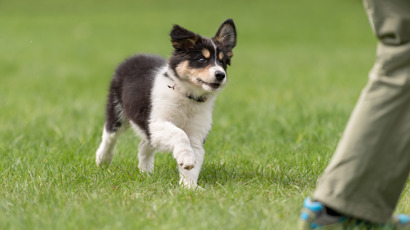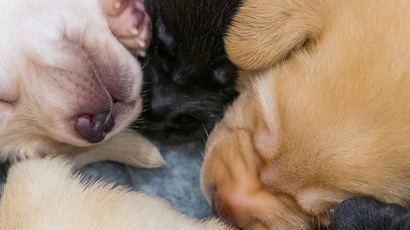Why do dogs lick?

Licking is a common dog behaviour and while in some situations it is a normal interaction, some types of licking is undesirable or may even be a sign of disease.
Dogs licking people: Is this safe?
Dogs often greet people with a lick if they are friendly but it is not necessarily a safe habit to encourage, given the potential for germs or even parasites which can be transferred to humans. It’s important to ensure your dog is always up-to-date with parasite preventatives, and that basic hygiene is carried out in the home when living with a dog, such as ensuring hands are washed prior to eating.
It is not recommended to allow a dog to lick your face.
It is best to discourage your dog from licking your children’s hands and faces.
Dogs licking themselves: Is this normal?
When dogs excessively lick themselves, it is can be a sign that they are feeling itchy. Sometimes the focus is just the paws, and their saliva can stain them brown, whereas sometimes the base of the tail can be the focus of attention. Allergic skin disease is common in dogs and the most common causes are atopic dermatitis, flea-allergy dermatitis and less often, food allergy.
Atopic dermatitis is by far the most common cause of allergic skin disease, but the other causes have to be ruled out first. While humans tend to get hayfever signs from inhaled allergens, dogs get itchy, resulting in excessive licking and secondary infections (yeast, bacterial or both).
Flea-allergy dermatitis tends to cause licking and biting at the base of the tail.
Sometimes there are no fleas seen as they’ve jumped off, or your dog has already removed them, but in allergic dogs, a single flea bite every 2 weeks can keep them licking until they are treated.
Food allergy can cause allergic skin disease but is a much less common cause than thought, making up less than 5% of itchy dogs1. Licking excessively can be a sign of food allergy.
If your dog is licking him or herself excessively, then consult with your veterinarian to determine the best way forward.
Dog is licking surfaces: Why?
While a small amount of surface licking is common, dogs that have a compulsion to lick various surfaces excessively may have an underlying disorder contributing to their clinical signs. These dogs should be assessed by a veterinarian and may need some for diagnostic investigation. This may involve blood tests, imaging or endoscopy if a gastrointestinal disorder is suspected, or referral to a veterinary behaviourist if an anxiety disorder, such as obsessive compulsive disorder (OCD), is suspected to be the cause2.
Excessive Licking of Surfaces (ELS) is certainly not normal behaviour and should be investigated by your veterinarian.
Dog is licking the air: Why?
What’s often known as ’lip smacking’ can be seen when a dog is anxious, especially in situations where your dog feels a bit uncertain. This is known as a displacement behaviour and is normal (yawning is another example of this). However, if your dog is seen to be licking the air rather than his or her chops, then this is not normal and needs to be assessed by your vet. The cause can be anything from allergies (an itchy tongue) to gastrointestinal disease (such as reflux), neurological disease (such as a focal seizure), or even obsessive-compulsive disorder (OCD)3.
Sometimes air licking can progress to air snapping, as though the dog is trying to catch something in the air with his or her mouth. This is known as ‘fly catching’ behaviour and is also abnormal.
Dogs like to use their tongues to interact with humans as well as their environment but it important that hand hygiene is practised to avoid disease transmission between dogs and humans. Dogs showing abnormal licking behaviours as such excessive surface licking or air licking should be examined by your veterinarian to determine the underlying cause.
References:
1. Chesney C. Systematic review of evidence for the prevalence of food sensitivity in dogs. Vet Rec. 2001;148:445-8.
2. Frank D. Repetitive behaviors in cats and dogs: Are they really a sign of obsessive-compulsive disorders (OCD)? Can Vet J. 2013;54:129-131.
3. Frank D. Obsessive-compulsive disorders: Medical, behavioural or both? Proceedings: 66th Convention of the Canadian Veterinary Medical Association, 2014.



